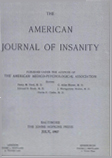STUDY OF THE AUDITORY APPARATUS IN PATIENTS EXPERIENCING AUDITORY HALLUCINATIONS
Abstract
1. The experiences termed auditory hallucinations are individual experiences, which require to be resolved into many factors.
2. To investigate auditory hallucinations more precisely audiometer examinations of 100 cases with auditory hallucinations were made.
3. Of these 100 cases there were 31 cases of deafness, 19 toxic deafness, 10 catarrhal deafness, and 2 nerve deafness.
4. Of the 19 cases of toxic deafness, 18 patients gave a history of a definite toxic factor, 16 alcoholism, 1 drug addiction, 1 toxemia with a septic infection of the throat.
5. No evidence of auditory hyperæsthesia was noted.
6. It was noted that the occurrence of an auditory hallucination during the audiometer examination interfered with the response of the patient.
The author wishes to express his appreciation to Dr. C. MacFie Campbell for his assistance in preparation of the paper, and to Dr. Leon E. White for his cooperation in interpretation of the otologic and audiometer findings.
Access content
To read the fulltext, please use one of the options below to sign in or purchase access.- Personal login
- Institutional Login
- Sign in via OpenAthens
- Register for access
-
Please login/register if you wish to pair your device and check access availability.
Not a subscriber?
PsychiatryOnline subscription options offer access to the DSM-5 library, books, journals, CME, and patient resources. This all-in-one virtual library provides psychiatrists and mental health professionals with key resources for diagnosis, treatment, research, and professional development.
Need more help? PsychiatryOnline Customer Service may be reached by emailing [email protected] or by calling 800-368-5777 (in the U.S.) or 703-907-7322 (outside the U.S.).



